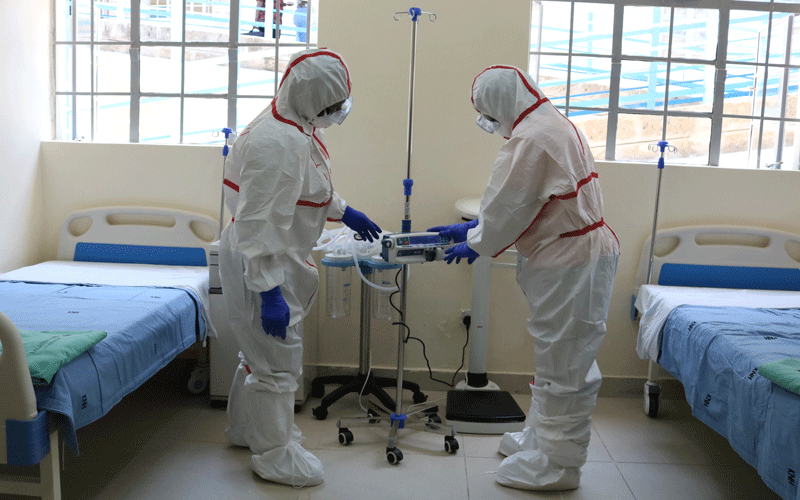Ten ways to boost your immunity, w*rding off d****y viruses

When it comes to fighting coronavirus, you already know handwashing and practising social isolation are key precautions. But experts say enhancing your body ability to fight diseases may also give you an edge in warding off viruses and staying healthy this season. Wambui Virginia collates some of the ways to fight off illnesses as suggested by various experts
Exercise therapy
You may be tempted to avoid the gym because it’s germy. But working out is a vital way to boost your immune system, says Mark Moyad, director of preventive and alternative medicine at the University of Michigan Medical Centre.
T his tip certainly comes in handy, especially in the wake of the Covid-19 pandemic.
“Exercise causes your body’s antibodies and white blood cells to circulate more rapidly, which means they may be able to detect and zero in on bugs more quickly.
Being active also lowers stress hormones, which reduces your chances of getting sick,” adds Moyad.
According to research, exercise may be key to keeping the virus at bay. This, however, must done with moderation.
“Like many other things, too much exercise can also stress on your body, it depresses your immune system,” explains Moyad. He recommends 30 to 60 minutes of most days of the week.
If you’re a germophobe, you don’t even need to hit the fitness centre, as walking outdoors will do the trick.
Watch your diet
“Eighty per cent of your immune system is in the gut, so when it’s healthy, we tend to be able to fight off infections faster and better,” says Yufang Lin of the Centre for Integrative Medicine at the Cleveland Clinic. 
She adds: “When it’s not, our immune system is weaker and more susceptible to fighting off infection.”
It’s therefore, important to adopt a diet rich in fruits, vegetables, whole grains and healthy fats, found in foods such as fatty fish, nuts and olive oil. “This eating pattern is high in nutrients such as vitamin C, zinc and other antioxidants shown to help reduce inflammation and fight infection,” says Lin. She, however, stresses the importance of limited meat, especially processed and fried foods, which are more inflammatory. A whole food diet is generally recommended. What’s more, it’s smart to include fermented foods, such as yogurt, fermented porridge, sour milk and the likes in your daily diet. These help build up the good bacteria in your gut, which, in turn, supports a healthy gut and immune system.
Stay on top of stress
There’s a strong link between your immune health and your mental health. “When you’re under chronic stress or anxiety, your body produces stress hormones that suppress your immune system,” Moyad says.
Stressed people are more susceptible to developing the common cold. A study published in Proceedings of the National Academy of Sciences exposed healthy adults to the cold virus, then monitored them in quarantine for five days.
Those who were too stressed produced cytokines, molecules that trigger inflammation, and were about twice as likely to get sick.
In addition, people who are stressed are less likely to pay attention to other healthy habits such as eating right and getting enough sleep, which can affect immunity.
Get enough sleep
Sleeping is another natural immune system booster. “Your immune system is like your computer, it needs moments of rest so it doesn’t become overheated,” Moyad explains. “Sleep reboots the system.”
When you’re sleep-deprived, your body churns out stress hormones such as cortisol to keep you awake and alert, which can suppress your immune system.
People who got a full eight hours of shut-eye had higher levels of T-cells than those who slept less, according to a 2019 study.
Try to get at least seven hours of slumber because you are less likely to come down with a cold.
Avoid excessive alcohol consumption
Numerous studies have found a link between excessive alcohol consumption and immune function.
Research shows people who drink in excess are more susceptible to respiratory illness and pneumonia and recover from infection and wounds more slowly.
Alcohol alters the number of microbes in the gut microbiome, a community of micro-organisms that affect the immune system.
Excessive alcohol can damage the lungs, and impair the mucosal immune system, which is essential in helping the body recognise pathogens and fight infection.
And it’s not just chronic drinking that does damage. Binge drinking can also impair the immune system.
Skip unproven supplements
Zinc supplements and lozenges are also a popular remedy for fighting off colds and respiratory illness.
Some studies have found that zinc lozenges may reduce the duration of cold by about a day and, may reduce the number of upper respiratory infections in children. But the data on zinc are mixed. 
If you already have enough zinc from your diet, it’s not clear that taking a supplement can help.
Zinc supplements also commonly cause nausea. To support your immune system, you can eat immunity supporting foods such as citrus fruits, garlic, broccoli, and spinach.
If your immune system is already weak, supplement with key vitamins and minerals that may have become depleted such as Vitamin C, Vitamin B, Vitamin D.
Reduce inflammation
Sugar, processed meat, vegetable oils, and alcohol tend are foods that cause inflammation in your body and so they busy the immune system, leaving other problems in your body unaddressed.
That’s why it can be really helpful to remove these inflammatory foods if we want a healthy immune system.
Stay away from toxins
Toxins can be devastating for the immune system. For example, mycotoxins from mould are notorious for destroying immuninity.
Many other toxins seem to have detrimental impact on immunity as well. So, try to minimise exposure to chlorinated drinking water, pesticides, aromatic hydrocarbons heavy metals, air pollution, and food additives.
Liver detoxification is essential to reduce toxins burden on our body.
Good gut health
Over 70 per cent of the body’s immune cells are located in the gut walls, which explains why good gut health is key to healthy bodily function.
The digestive system plays an important role in metabolising the body’s toxins as part of our natural detoxifying system.
An increase in fibre and roughage will help to keep moving any toxins through the gut swiftly.
The fibre in particular has a direct impact on improving microbiomes located within the digestive walls.
It’s also worth introducing a good quality pre- and probiotic supplement into your diet.
Stop smoking
Smokers and those with respiratory disease have a higher rate of serious illness and complications from coronavirus.
Anything that is challenging to your lungs is dangerous. Smoking is said to have a negative impact on both adaptive and innate immunity.
It can also increase chances of developing harmful pathogenic immune responses and smoking also reduces the effectiveness of your immune system’s defenses.
Smoking exposes one to infections such as pneumonia and influenza, severe and longer-lasting illnesses and lower levels of protective antioxidants such as vitamin C in the blood.






